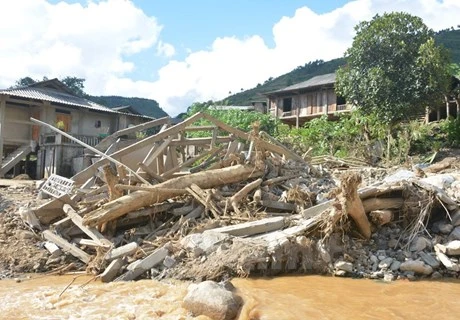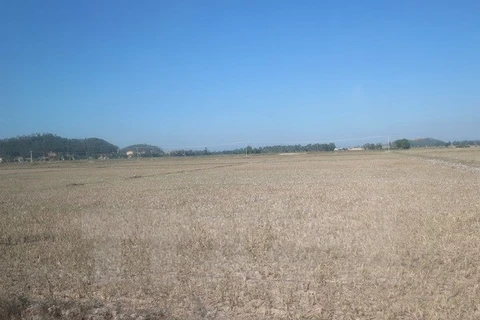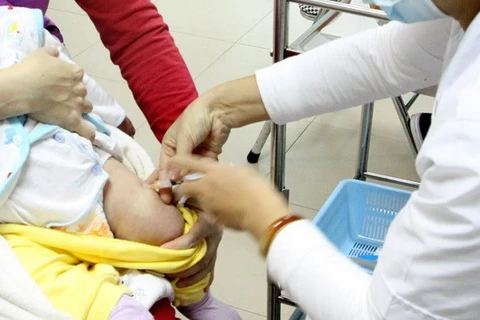 A doctor shows ethnic minority people in the border commune of Dan Hoa, Tuyen Hoa district, Quang Binh in central Vietnam how to prevent malaria. (Photo: VNA)
A doctor shows ethnic minority people in the border commune of Dan Hoa, Tuyen Hoa district, Quang Binh in central Vietnam how to prevent malaria. (Photo: VNA)Hanoi (VNA) – Vietnam has been making great strides to move from malaria control towards elimination of the disease, but increasing malaria in disadvantaged areas is threatening the country’s overall progress.
According to the World Malaria Report 2017 by the World Health Organisation, the global progress against malaria appeared to have stalled after many years of great public health achievements in response to the disease.
In 2016, 91 countries reported a total of 216 million cases of malaria, an increase of 5 million cases over the previous year. The global tally of malaria deaths reached 445 000 deaths, about the same number reported in 2015. Although malaria case incidence has fallen globally since 2010, the rate of decline has stalled and even reversed in some regions since 2014, the report said. Without urgent action, countries risk going backwards and missing the global malaria targets for 2020 and beyond.
Vietnam’s National Institute of Malariology Parasitology and Entomology estimated that an average of 30,000 people were infected by malaria virus in Vietnam annually, 100 out of which suffered from malignant malaria and about ten died.
In 2017, the number of malaria cases dropped by 35.4 percent from 2016. The Central Highlands remained the country’s hardest hit region which accounted for almost half of the cases.
In the first 14 weeks of 2018, Vietnam reported over 1,700 malaria cases, up 7.45 percent from the same period last year, with the Central Highlands and southern Binh Phuoc provinces carrying the majority of the national malaria burden, according to the Ministry of Health (MoH).
Binh Phuoc was the country’s most heavily-affected province with 738 malaria cases, up 70 percent from the same period of 2017. Meanwhile, faster growth was also seen in the Central Highlands province of Gia Lai where 201 people contracted the malaria virus, a 2.3-fold surge year on year. The neighbouring Dak Lak and Dak Nong reported 89 and 78 cases, representing 1.6-fold and 0.3-fold increases, respectively.
Malaria occurred mostly in disadvantaged areas where people know very little about how to prevent the disease, said the MoH’s Department of Preventive Medicine. Impacts of climate change which fuel the spread of mosquito-borne diseases and anti-malarial drug resistance alongside lack of responsibility from local authority have caused severe malaria outbreaks in areas where malaria control efforts are not sustainable. In addition, public budget for malaria control has declined sharply in recent years.
In response to this, the Department of Preventive Medicine has sent an inter-sectorial team to inspect and supervise malaria control work in hot-spots in Binh Phuoc, said head of the department Tran Dac Phu. At the same time, the National Institute of Malariology Parasitology and Entomology has worked with the local health authority to provide the province with technical support and effective measures on malaria control, he added.
The department plans to raise awareness of malaria prevention among people in the hot-spots, particularly high-risk groups like seasonal workers, farmers who stay in fields in the forest, forestry workers and forest managers in the time ahead. It will also provide drugs for these people and ensure they will get access to early diagnostic and treatment services.
This year’s World Malaria Day, April 25, is being celebrated under the theme “Ready to beat malaria” which aims to promote the commitment of the global community in uniting around the common goal of a world free of malaria.
Vietnam has adopted a national strategy on malaria prevention and elimination for the 2011 – 2020 period with a vision towards 2030. It aims to ensure that all people have better access to early diagnosis and prompt and effective treatment at public and private health facilities and to ensure the full protection for people at risk of malaria by appropriate malaria control measures.-VNA
VNA























